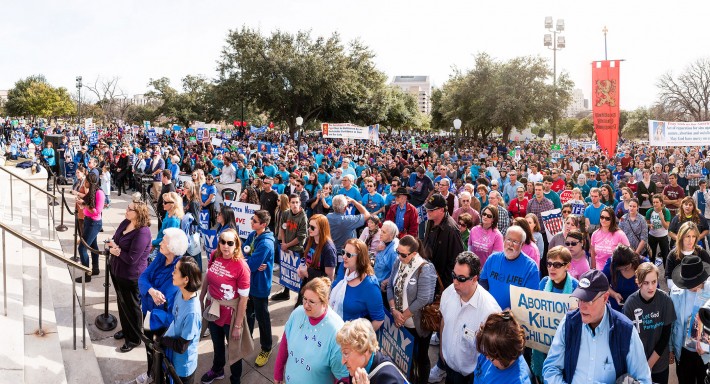
12:00 pm — Meet at 18th & N. Congress Ave. for the Ministry Fair (parking information)1:00 pm — Gather at 18th & N. Congress Ave. for the march to the Capitol (map)1:30 pm — Begin the march to the Capitol2:00-3:00 pm — Rally on South Steps of Capitol
The Rally will feature pro-life speakers and leaders from across the state, including Melissa Ohden, a national pro-life speaker who survived an abortion and recently told her story to Congress.Your presence will reaffirm recent pro-life gains, including the passage of House Bill 2; closing of numerous abortion facilities; opening of more pro-life pregnancy resource centers; passage of five major pro-life bills in 2015 by the Texas Legislature and the signing of those bills into law by pro-life Gov. Greg Abbott; the defunding of Planned Parenthood more than $30 million per year; the continued sales of the Choose Life license plate to promote infant adoption; and many more.
Plan to attend. Organize a bus or carpool of people from your church, youth group, or local pro-life organization. Individual signs will be provided, but bring a banner from your church, youth group, or pro-life organization.
To help defray the enormous cost of this event, make a tax-deductible donation HERE.
The U.S. Supreme Court decided to consider a challenge to HB 2, the pro-life law passed by wide margins in the Texas House and Senate and signed into law by then-Gov. Rick Perry in July 2013. That case is known as Whole Woman’s Health v. Cole. The lead plaintiff runs a chain of abortion facilities in Texas, New Mexico, and other states. They are challenging two key safety components of HB 2.
We believe the Court should uphold HB 2 and let it go completely into effect.
To help defend the law, Texas Alliance for Life is submitting an amicus curiae (“friend-of-the-court”) brief with the Supreme Court. We have hired one of the top attorneys in the country to help us make the case that the safety regulations in HB 2 are reasonable, medically justified, and constitutional. While the number of abortion facilities have decreased in recent years in Texas to the current 19 (nine that meet HB 2’s requirements and 10 that do not), the reality is that abortion will remain readily available everywhere even if HB 2 is allowed to go fully into effect. That is the requirement imposed by U.S. Supreme Court precedence. Though certainly not the preference of Texas Alliance for Life, that point needs to be made. The difference will be that abortion providers who do not already meet HB 2’s safety standards will no longer get a free pass to perform abortions at a substandard level of safety.
Hospital privileges for abortion doctors
The plaintiffs are challenging the requirement in HB 2 that physicians who perform abortions have privileges at a local hospital. In the event of a serious complication from the abortion and the woman or girl has to be transported to a local hospital emergency room, the physician should have privileges at that hospital so that he or she can continue to treat the patient. This provision was originally authored by pro-life Rep. Cindy Burkett (R-Sunnyvale).
During committee hearings on HB 2 and related bills, the Legislature heard compelling expert testimony that the standard of care for other outpatient medical or surgical procedures is for physicians to have privileges at local hospitals. Physicians who perform abortions should be held to the same standard.
While the plaintiffs argue that hospitals deny privileges to physicians because they perform abortions, this claim fails a reality check. Longstanding federal and state laws prevent the denial of privileges because a physician performs abortions at other locations. The granting of privileges is most often based on a judgment by the physician’s peers as to whether the hospital wants to accept the liability of having the physician practice medicine on site. Furthermore, any shortage of abortion doctors should be attributed to a lack of physicians who are willing to perform abortions, given that tens of thousands of physicians practice medicine in Texas to have privileges.
Ambulatory surgical center safety standards
A second challenged component of HB 2, originally championed by former state Sen. Bob Deuell (R-Greenville) requires licensed abortion facilities to increase their safety standards to the level of licensed ambulatory surgical centers (ASCs), outpatient surgery centers. Unlike licensed abortion facilities, ASCs assure their operating rooms are sterile, are well prepared to deal with serious complications onsite, and have wide hallways for transporting patients to hospitals during emergencies.
Critics of the ASC safety standards for abortion claim that the necessary costs are too great and make abortion economically nonviable. Indeed, a number of abortion facilities have chosen to close rather than upgrade. However, ASCs are common and widespread in Texas. The Department of State Health Services currently licenses 464 ASCs across the state, including the nine that regularly perform abortions. The type of medical procedures performed in ASCs include colonoscopy and cataract removal. A dilation and curettage after a miscarriage, the same procedure used for the vast majority of elective abortions in Texas’ licensed abortion facilities, is also typically performed in an ASC or hospital setting.

There are now nine ASCs that perform abortions in Texas — Austin has one, Dallas two, Houston has two, Fort Worth has one, and San Antonio has three. Collectively, these nine have enormous capacity to perform the ~60,000 annual abortions in Texas, even without the other low standard facilities of which there are 10. Nearly all of the abortion facilities that fail to meet HB 2’s safety standards are in close proximity to one or more of these ASCs. Also, the Plaintiffs failed to prove in the lower court hearings that more ASCs that perform abortions would not become available when HB 2 goes fully into effect.
Balancing the Rights of Patients and Doctors: Another Perspective on the Tragic Case of Chris Dunn
The following piece was written exclusively for Public Discourse by Deirdre Cooper, Texas Alliance for Life’s Public Policy Analyst, and Beverly Nuckols, M.D., Texas Alliance for Life Board Member .
.
When assessing the case of Christopher Dunn, in which some key details remain hazy, we ought to give his physicians and hospital ethics committee the benefit of the doubt.
In a recent Public Discourse essay, Philip Hawley, Jr., recounts the tragic death of Texan Chris Dunn. Hawley admirably defends a bioethics grounded on the intrinsic and inviolable dignity of all persons.
Unfortunately, his account of the case was based upon incomplete and sometimes factually incorrect reporting by other news outlets. An examination of court records presents a different picture of some key details of Dunn’s medical condition and the decision-making process undertaken by his family members and physicians.
On an ethical level, Hawley’s assertion that Dunn was subject to “death by committee” supposes an improper standard: namely, he assumes that the hospital and attending physician are guilty of murderous intentions until proven innocent. On the contrary, a review of the facts indicates it was possible and even plausible they did not intend to cause Dunn’s death. Moreover, Hawley fails to account for important implications of the conscience rights of doctors, who should not be bound to continue medical treatments that they believe to be causing more harm than good.
A More Complicated Picture
This is not simply a case of a hospital or a doctor versus the patient and his family. Rather, this is a case of an incapacitated patient who was terminally ill, whose parents disagreed about the best course of treatment, and whose doctors believed that life-sustaining treatment was causing suffering, as is plainly evident from court documents.